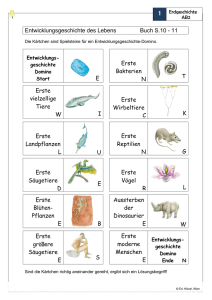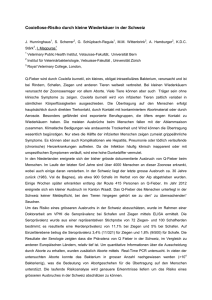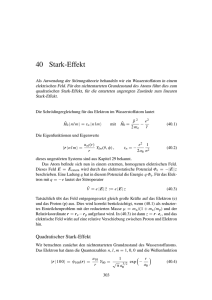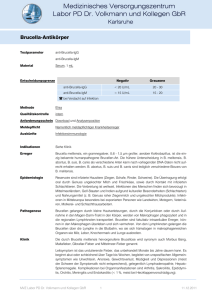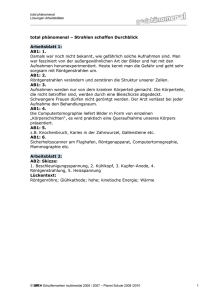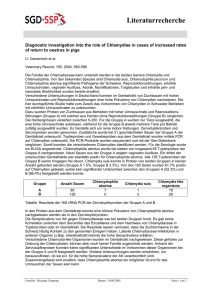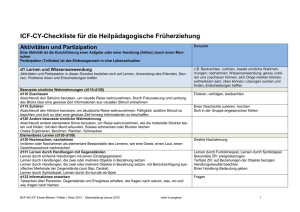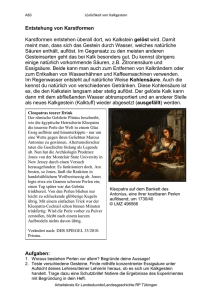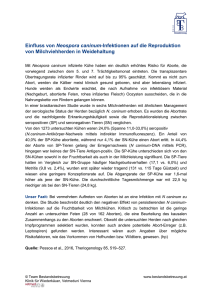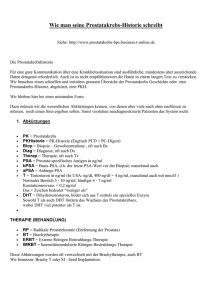Fetoskopie und Karyotyp bei Fehlgeburten
Werbung
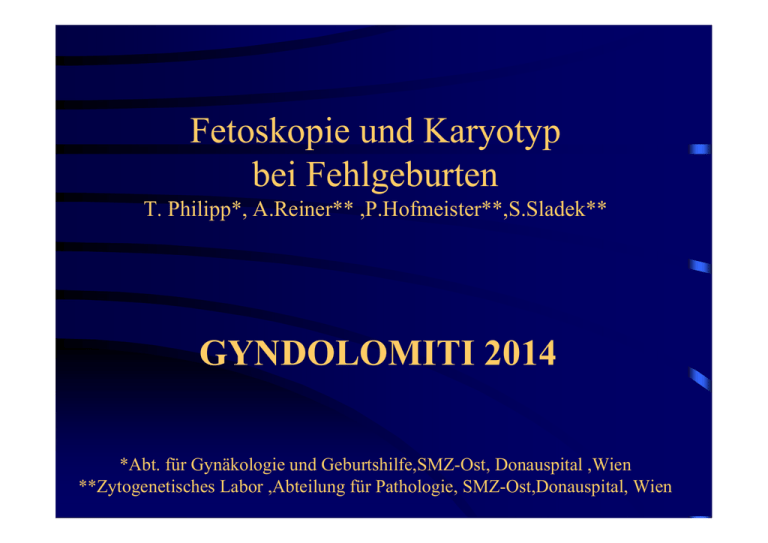
Fetoskopie und Karyotyp bei Fehlgeburten T. Philipp*, A.Reiner** ,P.Hofmeister**,S.Sladek** GYNDOLOMITI 2014 *Abt. für Gynäkologie und Geburtshilfe,SMZ-Ost, Donauspital ,Wien **Zytogenetisches Labor ,Abteilung für Pathologie, SMZ-Ost,Donauspital, Wien Abortus habitualis ¾Definition • (WHO) drei und mehr aufeinander folgende Fehlgeburten vor der 20.Schwangerschaftswoche • Unterschieden werden primäre habituelle Aborte sekundäre habituelle Aborte Abortus habitualis ¾Häufigkeit • habituelle Abortneigung betrifft 1-2 % der Paare mit Kinderwunsch Abortus habitualis ¾Prognosefaktoren • Anzahl der vorangegangenen Fehlgeburten • • • • Lebendgeburten in der Anamnese Karyotyp des Aborts Embryonale oder fetale Aborte ? Mütterliche Alter bei der Konzeption Maternal age and fetal loss: population based register linkage study. A.M.Nybo Anderson, J.Wohlfahrt, P.Christens, J.Olsen, M.Melbye . BMJ;320:1708-12,2000. Habituelle Aborte „Sinnvolle Untersuchungen“ DGGG 05.2008 9 Abklärung angeborener thrombophiler Faktoren (Faktor-V-LeidenMutation, Prothrombin-Mutation, Protein-C und –S,AT III Mangel) 9 Abklärung erworbener trombophiler Faktoren(Antikörper gegen ß2 Glucoprotein, Cardiolipin, Phosphatidylserin, Screening auf Screening auf Lupushemmstoff PTT-FS, aPTT-FSL, aPTT-LA,DRVVT-LA ) 9 Ausschluss endokriner Ursachen (TSH, TPO-AK,Prolaktin, LH, FSH,Estradiol Progesteron? HBA1c oGTT) 9 Ausschluss anatomischer Ursachen (Hysteroskopie +Pelviskopie; MRI, 3 D Ultraschall) 9 Ausschluss aszendierender Infektionen (Mikrobiologie der Zervix, insbesondere Chlamydien und Ureaplasmen) 9 Immunologische Abklärung (Th1/Th2) 9 Ausschluss genetischer Ursachen (genetische Beratung des Ehepaares und Chromosomenanalyse beider Partner Habituelle Aborte „Sinnvolle Untersuchungen“ DGGG 09.2006 However over 40% of couples with recurrent miscarriage are classified as having unexplained or idiopathic recurrent miscarriage.11,12 11. Clifford K, Rai R, Watson H, Regan L. An informative protocol forthe investigation of recurrent miscarriage: preliminary experience of 500 consecutive cases. Hum Reprod 1994; 9: 1328–32. 12. Stephenson MD. Frequency of factors associated with habitual abortion in 197 couples. Fertil Steril 1996;66: 24-29 . Abortus habitualis ¾Genetische Faktoren • Chromosomenstörungen der Elternpaare Abortus habitualis Chromosomenstörungen der Elternpaare • Gehäuftes Auftreten struktureller Chromosomenstörungen beim habituellen Abortus • 5 % der Fälle beim habituellen Abortus vs. 0.2 % in der Normalbevölkerung • balancierte Aberrationen eines Elternpaares (Balancierte Translokation, Robertson`sche Translokation) • Cave : unbalancierten embryonalen Chromosomenanomalien. M. S. Früh AB 2007 Früh AB 2008 monochoriale Gemini 23a Abortus habitualis fetale Ursachen ?? ¾Fetale Ursachen beim Abortus habitualis ? • 1. embryonale Chromosomenstörung ursächlich für die habituelle Abortneigung ? • 2. Fetale Malformationen mit einem normalem Karyotyp ??? Abortus habitualis embryonale Chromosomenstörung ¾ Problem(e): • • • • Abklärung der Abortursache nach dem 3.Abort Fehlendes Wachstum Häufige mütterliche ,bakterielle Kontamination Chromosomenstörungen 30 -50% beim Abortus habitualis. Carp H.,Toder V, Aviram A, DanielyM,Mashiah S,Barkai G. Karyotype of the abortus in recurrent miscarriage.Fertil Steril 2001;75:678-82. Stephenson MD,Awartani KA,Robinson WP.Cytogenetic analysis from couples with recurrent miscarriage: a case control study.Hum Reprod 2002;17:446-51. Embryonale Chromosomenstörungen beim Abortus habitualis ¾Chromosomenstörungen in 67 % der Fälle Morphologie Zahl (%) karyotypisiert Zahl (%) der Fälle Aborte mit Aberrationen N (%) N (%) N (%) Normal 17 10.1 16 94.1 5 31.3 GD1-GD4 72 42.8 70 97.2 46 65.7 Kombinierte Defekte 71 42.3 71 100 55 77.5 8 4.8 8 100 5 62.5 100 165 Isolierte Defekte Gesamt 168 98.2 111 67.3 45, X Trisomie Polyploidie Triplodie/ Tetraploidie 2 3 2 2 4 5 6 7 4 8 4 9 4 10 11 12 13 14 15 16 17 18 20 21 22 * * 4 5 12 9 3 4 3 8 14 5 5 11 11 4 TECHNIK DER CVS BEIM ABORTUS Ferro J, Martinez MC, Lara C. et al, Improved accuracy of hysteroembryoscopic biopsies for karyotyping early missed abortions. Fertil. Steril 2003; 80:1260-4. Philipp T, Feichtinger W, Van Allen M. et al, Abnormal embryonic development diagnosed embryoscopically in early intrauterine deaths after in vitro fertilization (IVF):A preliminary report of 23 cases. Fertil Steril 2004; 82:1337-42 Habituelle Aborte fetale Chromosomenstörung? • Aneuploidien/ Polyploidien letale Genommutationen • Ca.70 % der Fälle läßt sich Abortus habitualis die Abortursache durch eine zytogenetische Untersuchung des Abortmaterials abklären • Rez. Aneuploidie-Polyploidie relevanter ätiologischer Faktor beim Abortus habitualis ??? Wiederholte Chromosomenstörung I 39/69(57%) AU 39a AF 37a P1 AB3 P1 AB2 47,XX,+15 47,XX,+13 AE 18a P0 AB2 AS 37a P1 AB3 BU 30a P0 AB2 CK 34a P0 AB2 DB 25a P0 AB2 47,XX,+9 45,X 48,XY, +6,+21 47,XX, +18 45,X 47,XY,+4 92,XXX 45,X 47,XY,+4 47,XY,+9 92,XXXX 47,XY,+16 47,XY,+22 DF 40a P0 AB3 EG 34a P7 AB2 FB 36a P1 AB5 47, XY,+16 47,XX ,+17 48,XX,+7, +18 47,XY,+15 47,XY,+22 47,XX,+18 Wiederholte Chromosomenstörung II 39/69(57%) GR P0 AB2 HL 31a HV 38a H.S. 41a KB 31a KD 31a P0 AB3 P0 AB2 P1 AB3 P1 AB2 P1 AB3 47,XY,+18 45,X 69,XXY 47,XY,+21 47,XY,+21 47,XY,+16 Structural Structural 45,X 47,XY,+16 47,XX,+22 KE 28a KK 41a KR 36a KR 36a P0 AB4 P0 AB4 P1 AB3 P0 AB3 47,XX,+16 47,XY,+16 47,XY,+22 47,XX,+16 47,XY,+2 47,XY,+16 47,XX,+21 47,XX,+21 47,XX,+8 48,XX,+8,+ 13 Wiederholte Chromosomenstörung III 39/69(57%) LA 38a P0 AB2 NO 34a P1 AB3 PA 37a P0 AB3 47,XX,+8 47,XX,+4 47,XX,+13 47,XX,+22 47,XY,+14 47,XX,+21 47,XX,+14 PA 37a RA 34a RE 27a SB 36a P0 AB3 P0 AB2 P0 AB2 P0 AB3 47,XX,+16 47,XY,+16 46,XY, del(13)8q 13) 47,XX,+18 47,XX,+16 69,XXY 69,XXY SG 38a P0 AB2 SK 34a SO 40a P1 AB2 P0 AB4 47,XY,+21 47,XX,+22 92,XXYY 45,X 47,XY,+18 47,XX,+16 47,XY,+21 Wiederholte Chromosomenstörung IV 39/69(57%) VB 39a P0 AB4 VS 39a P3 AB3 WA 34a WC 28a WE 25a WJ 37a P0 AB2 P0 AB3 P1 AB5 P0 AB4 47,XY, +16 47,XY, +15 47,XY,+15 47,XY,+14 47,XX,+22 P0 AB2 YY 37a P1 AB3 ZS P0 AB3 47,XY, +16 47,XX, +16 47,XY,+22 WP 36a 47,XX, +19 69,XXX 69,XXY 69,XXY, del(6)q21 47,XX, +20 47,XY, +21 46,XX, +22 48,XX, +8,+14 45,X 45,X Wiederholte Euploidie 15/69(22%) BD 26a P0 AB4 DS 24a P3 AB3 46,XX 46,XY 46,XY 46,XX 46,XY GN 25a HM 36a KM 36a KR 18a KS 28a MK 28a NC 37a RR 24a SM 38a SD 33a SP 33a WM ZC 29a 19a P1 AB2 P1 AB2 P0 AB2 P0 AB2 P0 AB3 P0 AB6 P0 AB3 P0 AB5 P0 AB2 P2 AB4 P0 AB2 P0 AB5 46,XX 46,XY 46,XX 46,XX 46,XX 46,XX 46,XY 46,XY 46,XX 46,XX 46,XY 46,XY 46,XY 46,XY 46,XY 46,XY 46,XX 46,XY 46,XX 46,XX 46,XX 46,XX 46,XX 46,XY 46,XX 46,XY 46,XY 46,XY 46,XY P0 AB2 Habituelle Aborte fetale Malformationen ?? • embryonale Malformationen mit einem normalem Karyotyp ??? • Problem : Embryo selten einer detaillierten morphologischen Abklärung zugänglich Morphologie spontan abortierter Embryonen Untersuchungstechnik Morphologie spontan abortierter Embryonen 5.Entwicklungswoche Ultraschall - Embryoskopie Gaumentwicklung Physiologischer Nabelschnurbruch Gliedmaßenentwicklung Extremitätenknospe 5.Woche Handplatte 6.Woche Finger flossenartig Finger getrennt 8.Woche 8.Woche Fingerstrahlen gefurcht 7.Woche Morphologie spontan abortierter Embryonen Handmalformationen Morphologie spontan abortierter Embryonen Neuralrohrdefekte Morphologie spontan abortierter Embryonen Neuralrohrdefekte SSL 17 mm 46,XX Morphologie spontan abortierter Embryonen Neuralrohredefekte SSL 15 mm 69,XXY SSL 14mm 69,XXY Morphologie spontan abortierter Embryonen Neuralrohredefekte SSL 14 mm SSL 17 mm 69,XXX 47,XX,+14 Das embryonale Gesicht Morphologie spontan abortierter Embryonen Lippenspalte SSL 27 mm 47,XY,+9 Morphologie spontan abortierter Embryonen Lippenspalte Morphologie Gesichtsmalformationen SSL 19 mm 69,XXY Habituelle Aborte fetale Malformationen mit normalem Karyotyp Habituelle Aborte fetale Malformationen mit normalem Karyotyp Habituelle Aborte fetale Malformationen mit normalem Karyotyp Habituelle Aborte fetale Malformationen mit normalem Karyotyp Habituelle Aborte fetale Malformationen mit normalem Karyotyp Habituelle Aborte fetale Malformationen mit normalem Karyotyp Kongenitale Fehlbildungen Ursachen Embryonale Chromosomenstörungen beim Abortus habitualis ¾Chromosomenstörungen in 67 % der Fälle Morphologie Zahl (%) karyotypisiert Zahl (%) der Fälle Aborte mit Aberrationen N (%) N (%) N (%) Normal 17 10.1 16 94.1 5 31.3 GD1-GD4 72 42.8 70 97.2 46 65.7 Kombinierte Defekte 71 42.3 71 100 55 77.5 8 4.8 8 100 5 62.5 100 165 Isolierte Defekte Gesamt 168 98.2 111 67.3 45, X Trisomie Polyploidie Triplodie/ Tetraploidie 2 3 4 2 2 1 5 6 7 4 8 4 9 4 10 11 12 13 14 15 16 17 18 20 21 22 * * 4 4 12 9 3 4 3 8 14 5 5 11 11 4 ZUKÜNFTIGE ENTWICKLUNGEN ? GENETISCHE ABKLÄRUNG ¾Karyogramm: Darstellung aller Chromosomen einer Zelle nach morphologischen Kriterien . ¾Anzahl ,Größe Verteilung und Intensität +Muster dieser Banden ist für jedes Chromosom spezifisch ¾Deletionen,Duplikationen SSL 3mm 46,XY < 20 Mb nicht dargestellt werden. ZUKÜNFTIGE ENTWICKLUNGEN der ABKLÄRUNG ¾CGH array based genome analysis (CGH array) ¾Mikrodeletionen, Mikroduplikationen < 1Mb Genomic changes detected by array CGH in human embryos with developmental defects E. Rajcan-Separovic1,6, Y. Qiao1,2, C. Tyson3, C. Harvard1, C. Fawcett3, D. Kalousek1, M. Stephenson4 and T. Philipp5 + Abstract Developmental abnormalities of human embryos can be visualized in utero using embryoscopy. Our previous embryoscopic and genetic evaluations detected developmental abnormalities in the majority of both euploid (74%) and aneuploid or polyploid (90%) miscarriages. Since we found the pattern of morphological changes to be similar in euploid and non-euploid embryos, we proposed that lethal submicroscopic changes, not detected by standard chromosome testing, may be responsible for miscarriage of euploid embryos. Whole genome oligo and bacterial artificial chromosome array comparative genome hybridization (CGH) was used to screen for submicroscopic chromosomal changes (DNA copy number variants or CNVs) in 17 euploid embryonic miscarriages, with a range of developmental abnormalities documented by embryoscopy. The CNV breakpoints were refined using a custom array (Agilent) with high resolution coverage of the CNVs. Six unique CNVs, previously not reported, were identified in 5 of the 17 embryos (29% of all cases or 50% of cases studied with higher resolution arrays). All six unique CNVs were <250 kb in size. On the basis of parental array CGH analysis, a de novo origin of a CNV was determined for one embryo (at 13q32.1) and suspected for another (at 10p15.3). Three CNVs, at Xq28, 1q25.3 and 7p14.3, were inherited and a CNV at 17p13.1 was of unknown origin. The genes contained within these unique CNVs will be discussed, with specific reference to rearrangements of syntaxin and tryptophan-aspartic acid (WD) repeat genes. Our report describes for the first time, de novo and inherited unique CNVs in euploid human embryos with specific developmental defects. Mol Hum Reprod 16(2):125-134 (2010) ZUKÜNFTIGE ENTWICKLUNGEN ? ¾CGH array: Mikrodeletion kurzen Arm Chromosom 12 ¾NF3 (neutrophin 3 precursor) Karyotyp 46,XY ¾Wachstum und Differenzierung Neuronen (Chalazonitis et al 2004; Wilkinson et al 1996). Habituelle Aborte fetale Ursachen ?? • wichtige Zusatzinformation bei der individuellen Abklärung des wiederholten Aborts • Bei schwerer Ausprägung der Fehlbildungen ist es vorstellbar ,daß die nachgewiesen Malformationen die Ursache des Abortes sind. • Normaler Karyotyp schließt eine fetale ,„genetische“ Abortursache nicht aus. • Einzelgendefekte ? ,submikroskopische Defekte“ ? -normaler Karyotyp ein prognostisch ungünstiges Zeichen• Zukunft : Detaillierte ,maternale Abklärung und Einleitung einer (teuren) Therapie sollte nach Ausschluß fetaler Faktoren erfolgen. INDIKATION detaillierte maternale Abkärung? P0 AB2 46,XX INDIKATIONEN EMBRYOSKOPIE ? • Abortus habitualis(2. Abortus ACOG) American college of obstetricians and Gynecologists. Management of recurrent early pregnancy loss. ACOG Practice Bulletin No.24,February 2001.Int.J Gynecol Obstet 2002;78:179-90. Cost-effectiveness of cytogenetic evaluation of products of conception in the patient with a second pregnancy loss. Foyouzi N, Cedars MI, Huddleston HG. Source Department of Obstetrics, Gynecology and Reproductive Sciences, University of California San Francisco, UCSF Center for Reproductive Health, San Francisco, California. Abstract OBJECTIVE: To compare the cost of two strategies for managing the patient with recurrent pregnancy loss (RPL). DESIGN: Cost analysis using a decision analytic model was used to compare obtaining an evidence-based workup (EBW) for RPL versus obtaining a karyotype of the products of conception (POC) and proceeding with an EBW only in the setting of euploid POC. SETTING: Outpatient care. PATIENT(S): A simulated cohort of patients experiencing a second pregnancy loss. INTERVENTION(S): Not applicable. MAIN OUTCOME MEASURE(S): Total cost of investigating the cause of RPL after a second pregnancy loss. RESULT(S): For all age categories, obtaining a karyotype of POC was less costly than an evidenced-based RPL evaluation. Monte Caro analysis demonstrated a net economic benefit for the karyotype strategy ($4,498 [±$792] vs. $5,022 [±$1,130]). CONCLUSION(S): Our model suggests an economic advantage for obtaining a karyotype of POC in women with second miscarriage. Copyright © 2012 American Society for Reproductive Medicine. Published by Elsevier Inc. All rights reserved. Fertil Steril. 2012 Jul;98(1):151-155.e3. Is chromosome testing of the second miscarriage cost saving? A decision analysis of selective versus universal recurrent pregnancy loss evaluation Lia A. Bernardi, M.D. Beth A. Plunkett, M.D., M.P.H. Mary D. Stephenson, M.D., M.S. Objective To compare the cost of selective recurrent pregnancy loss (RPL) evaluation, which is defined as RPL evaluation if the second miscarriage is euploid, versus universal RPL evaluation, which is defined as RPL evaluation after the second miscarriage. Traditionally, an RPL evaluation is instituted after the third miscarriage. However, recent studies suggest evaluation after the second miscarriage, which dramatically increases health care costs. Alternatively, chromosome testing of the second miscarriage, to determine whether an RPL evaluation is required, has been proposed. Design Decision-analytic model. Setting Academic medical center. Patient(s) Couples experiencing a second miscarriage of less than 10 weeks size. Intervention(s) Selective versus universal RPL evaluation after the second miscarriage. Main Outcome Measure(s) Estimated cost for selective versus universal RPL evaluation. Result(s) The estimated cost of selective RPL evaluation after the second miscarriage was $3,352, versus $4,507 for universal RPL evaluation, resulting in a cost savings of $1,155. With stratification by maternal age groups, selective RPL evaluation resulted in increased cost savings with advancing maternal age groups. Conclusion(s) Selective RPL evaluation, which is based upon chromosome testing of the second miscarriage, is a cost-saving strategy for couples with RPL when compared with universal RPL evaluation. With advancing maternal age groups, the cost savings increased. Fertil Steril. 2012 Jul;98(1):156-161. INDIKATIONEN EMBRYOSKOPIE ? ¾Abortus habitualis(2. Abortus AMSOG) ¾Embryonale Abortus nach IVF EMBRYONALER ABORT NACH IVF SSL SSL3mm 3mm 47,XY,+3 47,XY,+3 SSL SSL88mm mm 46,XX 46,XX SSL SSL18 18mm mm 47,XX,+14 47,XX,+14 SSL SSL16 16mm mm 47,XX,+14 47,XX,+14 SSL SSL22 22mm mm 46,XX,-14, 46,XX,-14, +t(13q;14q) +t(13q;14q) ZUSAMMENFASSUNG MORPHOLOGIE UND ZYTOGENETISCHER BEFUND BEI 74 ABORTEN NACH IVF Morphologie Zahl (%) der Fälle Normal GD1-GD4 3 1 4 N (%) N (%) N (%) 6 8.1 6 100 2 33.3 39 52.7 38 28 73.7 88.0 97.4 Kombinierte Defekte 25 33.8 25 100 21 Isolierte Defekte 4 5.4 4 100 3 Gesamt 74 100 73 5 98.6 54 45, X Trisomie Mittleres Alter 35a (25-42a) 2 Aborte mit Aberrationen Zahl (%) karyotypisiert 6 7 8 9 10 11 12 13 14 15 16 17 18 20 21 22 * * 1 1 1 1 1 1 1 2 5 5 10 1 2 3 6 3 2 4 100 74.0 Polyploidie Triploidie Tetraploidie 2 EMBRYONALER ABORT NACH IVF EMBRYONALER ABORT NACH IVF INDIKATIONEN EMBRYOSKOPIE ? ¾Abortus habitualis(2. Abortus AMSOG) ¾Embryonale Abortus nach IVF ¾Auffällige Ultraschall beim embryonalen Abort INDIKATIONEN EMBRYOSKOPIE INDIKATIONEN EMBRYOSKOPIE SSL 34 mm 46,XX INDIKATIONEN EMBRYOSKOPIE Petra Hofmeister Silvia Sladek *Evidence –based guidelines fort the investigation and medical treatment of recurrent miscarriage Human Reproduction 2006;21:2216-2222 **Mangement of recurrent early pregnancy loss. Internation Journal of Gynecology and Obstetrics 2002 ;76:179-190 *** Royal College of Obstetricians and Gynaecologists. The investigation and treatment of couples with recurrent first trimester miscarriage and second trimester miscarriage. Green top guidelines No 17.2011 Untersuchung ESHRE* ACOG** RCOG*** Erworbene Thrombophilie APS Lupus Antikoagulans Antikardiolipin AK empfohlen empfohlen empfohlen Angeborene Thrombophilie Faktor V Leiden Mutation Prothrombin Mutation Protein S Mangel ------------ empfohlen (Bei fetalen Aborten) empfohlen (Bei fetalen Aborten) empfohlen empfohlen ---------------------------------- ------------------------------------------------------Endometriumbiopsie ------------------------------------------------------------- Immunologische Faktoren NK Zellen CD 56 NK Mannan binding lectin ANA --------------------------------------------- --------------------------------------------------- --------------------------------------------- Genetische Faktoren Karyotyp der Eltern Karyotyp Abort empfohlen Studien empfohlen ? empfohlen wenn cyt. auff. AB empfohlen Anatomische Faktoren 3 D Ultraschall HSK+ LSK empfohlen empfohlen empfohlen bei auffälligem Ultraschall MTFR Mutattion ------------ --------------- ------------ Mikrobiologische Faktoren Clamydien, Mycoplasmen,TORCH ------------ --------------- ------------ Endokrine Faktoren Diabetes mellitus Hypothyreose LH Hypersekretion Hyperprolaktinämie Lutealphasendefekt *Evidence –based guidelines fort the investigation and medical treatment of recurrent miscarriage Human Reproduction 2006;21:2216-2222 **Mangement of recurrent early pregnancy loss. Internation Journal of Gynecology and Obstetrics 2002 ;76:179-190 *** Royal College of Obstetricians and Gynaecologists. The investigation and treatment of couples with recurrent first trimester miscarriage and second trimester miscarriage. Green top guidelines No 17.2011 Therapie ESHRE* ACOG** RCOG*** Erworbene Thrombophilie Heparin?+ Aspirin mehr RCT empfohlen empfohlen Angeborene Thrombophilie Heparin mehr RCT empfohlen bei fetalen Aborten empfohlen bei fetalen Aborten empfohlen empfohlen mehr RCT --------------------------? mehr RCT ------------mehr RCT ---------------------------------- Immunologische Faktoren IVIG Leukozytenimmunisation Glucocorticoiden mehr RCT ---------------------------------------- ------------------------------------- Genetische Faktoren Karyotyp der Eltern Genetische Beratung empfohlen Genetische Beratung empfohlen Genetische Beratung empfohlen Anatomische Faktoren Septumresektion Cerclage Op HSK empfohlen Op HSK empfohlen mehr RCT CK>25mm MTFR Mutattion Folsäure? mehr RCT -------------- -------------- Mikrobiologische Faktoren TORCH ------------ -------------- -------------- Endokrine Faktoren Diabetes mellitus Hypothyreose Gestagen LH Supression Metformin HCG „Aneuploidie/ Polyploidie/ Euploidie“ 15/69(22%) BS 30a P0 AB5 BS 40a P0 AB5 DA 26a P2 AB2 45,X EN P4 AB3 46,XX 46,XY 46,XX 47,XX ,+21 47,XX ,+15 HA 25a JJ 38a KB 35a KD 25a NP 35a PC 38a PE 30a SK 44a SS 22a WF 34a ZM 38a P1 AB3 P1 AB2 P0 AB3 P1 AB3 P0 AB3 P0 AB3 P0 AB4 P1 AB2 P0 AB3 P1 AB3 P1 AB4 46,XY 46,XY 46,XY 45,X 47,XX , +15 71,XX Y,+18, +20 69, XXY 46,XX ,+8 46,XX 45,X 46,XX 47,XX ,+14 46,XY 46,XX 46,XX 47,XX ,+2 46,XX 46,XX 46,XY , t(8;22 )8q? 24 ;q ?12) 48,XX ,+15, +21 46,XX 47,XY, +16 46,XX 46,XX 46,XX 47,XX, +3
